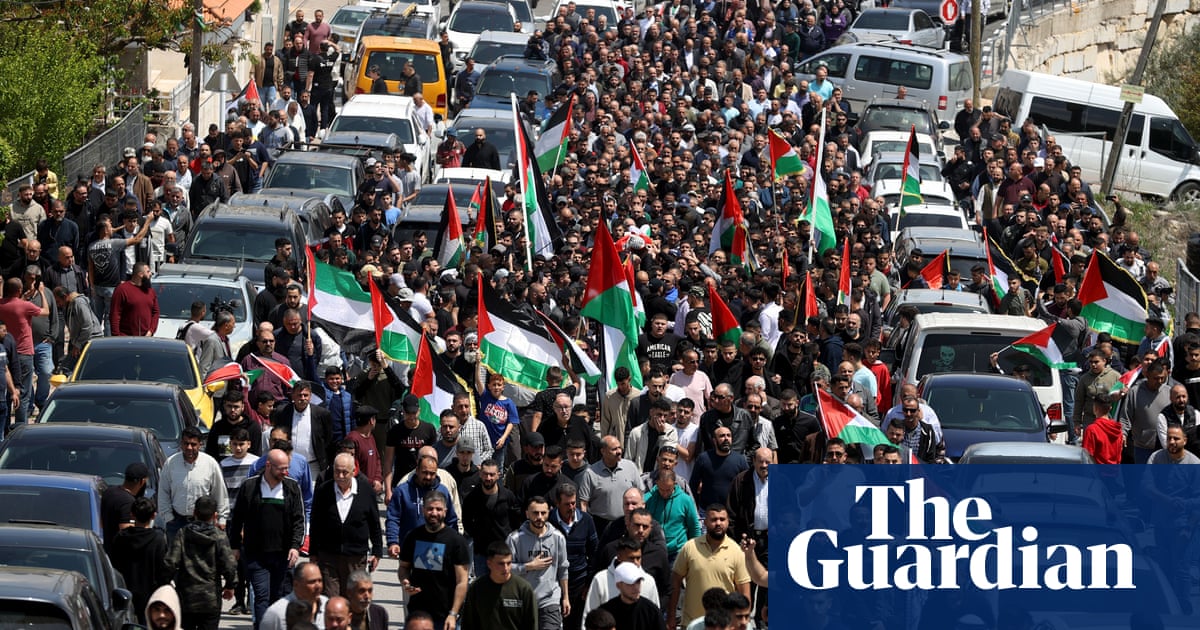
Khaled Arouq was in his pyjamas when he was killed, shot by a sniper before dawn during a recent Israeli raid close to the centre of Ramallah. The 16-year-old, who had joined a group throwing stones at Israeli armoured vehicles, was shot in the chest and pronounced dead on arrival at the local hospital.
“My son was killed in cold blood,” said his father, Sulaiman, his voice heavy. “They shot him right next to our house.”
The junction where Arouq was shot is just a few feet from his home on Athens street, in one of Ramallah’s most expensive neighbourhoods. Shiny four-wheel-drive cars sit in sweeping driveways beneath clipped pines and new sleek beige stone buildings housing those close to the commercial and political powers of the West Bank.
A large yellow banner strung above the door of Arouq’s former home displayed the teenager’s placid baby-face next to portraits of the president of the Palestinian Authority (PA), Mahmoud Abbas, and longtime former leader Yasser Arafat.
Sulaiman Arouq is a colonel in the PA’s military intelligence division, part of the paramilitary security forces that were intended to guard the ossifying ruling body which controls parts of the West Bank.
“They don’t defend anyone, they hide when the Israelis come,” he said of the PA’s security forces. “Of course we need protection, and they should be the ones protecting us.”
Israeli military raids on areas of the West Bank nominally under the complete control of the PA used to be rare, normally targeting refugee camps or places on the outskirts of urban centres. That changed after the 7 October attack, when Hamas militants overran towns and kibbutzim, killing an estimated 1,136 people.
Ramallah, the de facto PA capital, is entirely run by Hamas rivals Fatah, but residents say that since October, violent raids have become commonplace. The sight of Israeli armoured vehicles rolling past upmarket coffee spots and glass-fronted offices has left them feeling more vulnerable than ever before.
Criticism of Abbas is easy to find even in the centre of Ramallah, particularly as his security forces were already better known for beating protesters with batons or detaining journalists and activists than they were for protecting the population from Israeli attacks. The PA security forces were set up after the 1994 Oslo peace treaty with Israel, charged with policing Palestinians and all but prohibited from confronting Israeli forces.
But a recent sharp rise in violence from the Israeli security forces and settlers has fuelled a sentiment that if the PA is unable to protect Palestinians even in its centre of power, there is little point to its rule at all.
The rise in Israeli incursions has come with frequent use of deadly force, even against children.
Save the Children said at least 116 children have been killed in the West Bank since October,either by the Israeli military or settlers.
A spokesperson for the Israeli border police said that Arouq was shot as he was part of a group “throwing stones and rocks” at forces present during the raid in Ramallah, “who risked their lives. The fighters responded by shooting to neutralise the threat”.
When the Arouqs’ neighbour Fadi Jabari saw on social media that Israeli forces had arrived at a nearby roundabout, he made sure to stay away from the balcony or windows in fear of gunfire.
“I’m also from the PA, I’m a police [officer] – but what can we do?” he said. “Whether [the Israelis] have something on you or not, they can execute you. It’s revenge.”
Before October, he said, Israeli raids were unusual. “They’d come, but not with this brutality, using stun grenades, rubber bullets or teargas. Now it’s all live bullets and they shoot to kill.”
Israeli raids have risen across the West Bank, but the increase in operation in places where the PA is nominally in charge has only undermined its already tenuous authority.
Abbas, 88 – who has been in power for two decades and has long failed to hold promised elections – is perceived by his many critics as deferential to the Israeli government, which has frequently blocked the PA from receiving its own tax revenue.
Hanan Ashrawi, a long-serving Palestinian politician and member of the Palestine Liberation Organization, which Abbas also heads, said his reluctance to leave power is a consequence of years of western support for his increasingly unpopular rule.
“The problem right now is you have horrific carnage that has to be dealt with, and our leadership was seen to be missing in action. For decades it was told the only way to survive and stay in power was by making nice,” she said.
“They lost sight of the fact that people feel you have no legitimacy if you postpone elections and distort your decision-making to suit the Americans.”
Ashrawi resigned from the PLO executive committee four years ago, citing a need to make space for younger leaders. The stagnant politics of the PA have instead fuelled resentment among young people of Khaled Arouq’s generation, prompting some to take up arms.
“There are many things wrong, but it’s our business. We will do it, we will reform,” Ashrawi said of the Palestinian leadership. “But you have to save Palestinians not from Mahmoud Abbas, but from the Israeli army and government, the thugs and terrorist settlers in the West Bank.”












